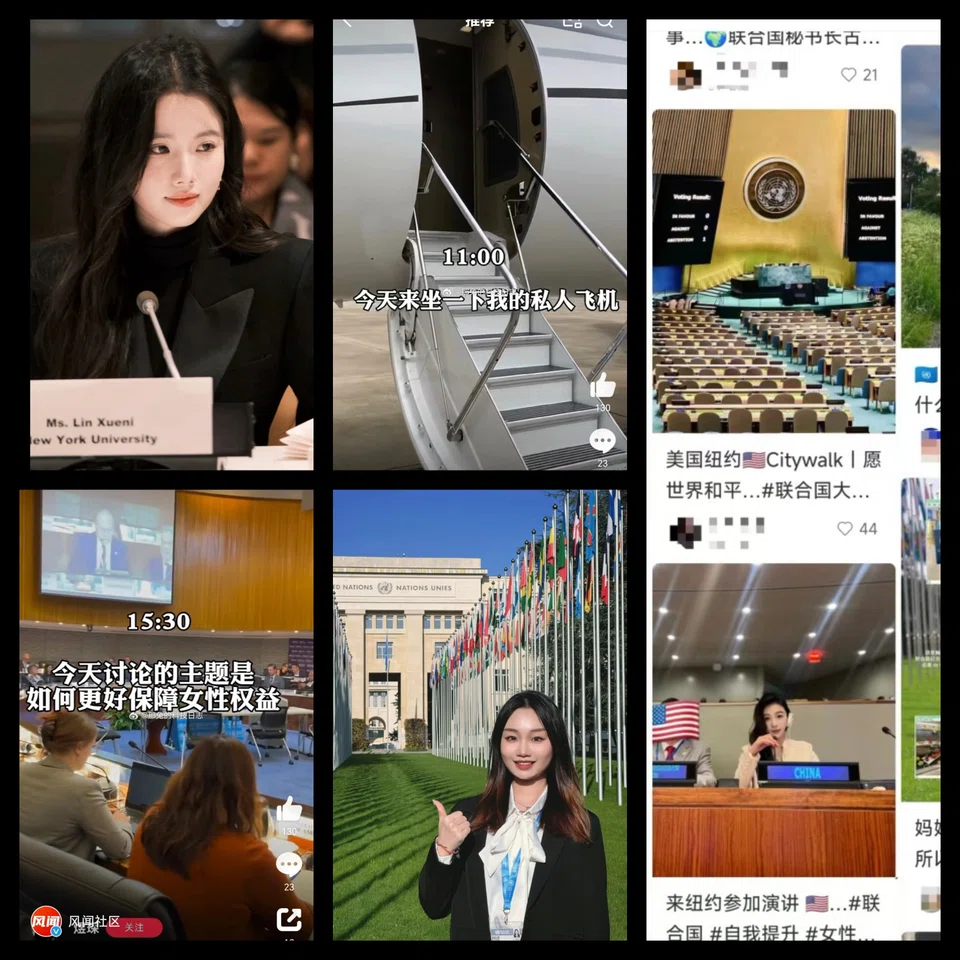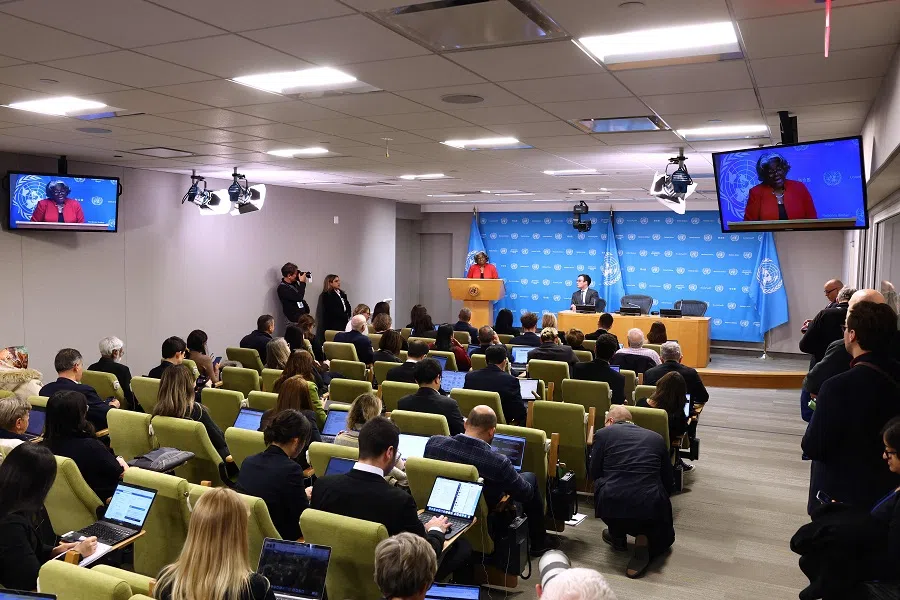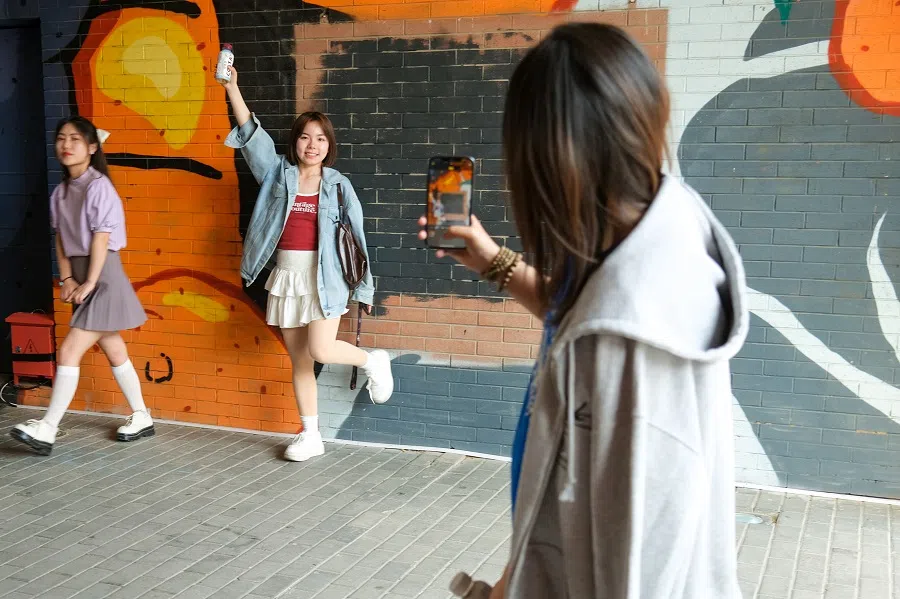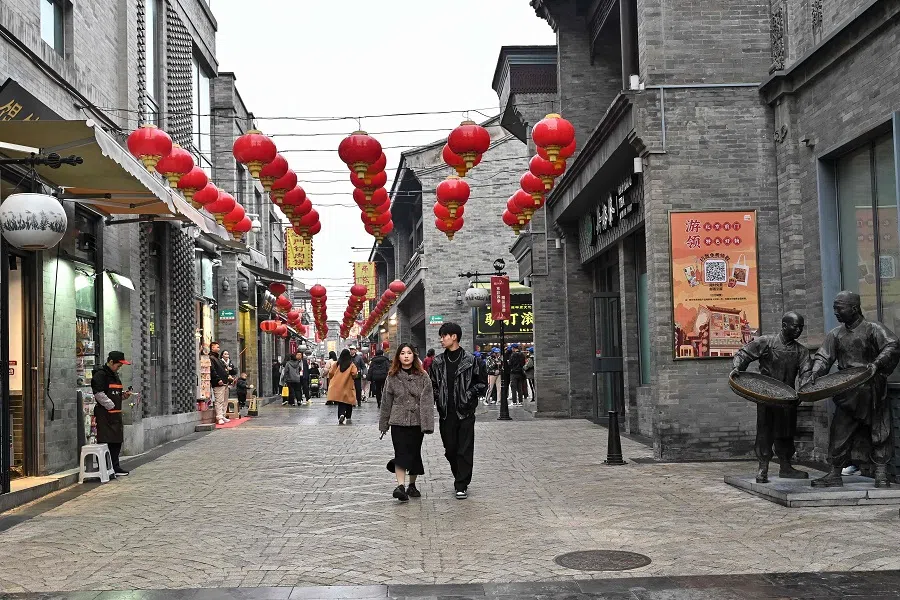The curious case of China’s ‘UN socialites’
China is seeing the rise of “UN socialites” — influencers who post content of themselves at the UN headquarters as they give speeches, attend briefings or receive awards. But who are these influencers and what has given rise to this bizarre phenomenon? Lianhe Zaobao’s China Desk looks into the issue.

Who would have thought that the United Nations headquarters — a gathering place for global political, diplomatic, and intellectual elites — would become a stage for so-called Chinese “socialites”?
Recently, Chinese social media has seen the rise of a group referred to as “UN socialites”. From makeup and clothing style to mannerisms, they appear to be cut from the same mould — dressed in professional business attire with impeccable makeup, posing for photos under the national flags outside the UNHQ. Some even appear in meeting rooms where they are pictured receiving awards or giving speeches.
Even more bizarrely, their posts or videos often start with statements like “Today, I’m attending a conference at the UN”; “Today, I’m giving a speech and receiving an award at the UN”; or “Speaking out for world peace”. The topics they discuss are strikingly similar, ranging from youth development to climate change or women’s and children’s issues.
Who are these ‘perfect’ socialites?
In an instant, these socialites — who typically flaunt luxury brands, cars, and gourmet meals online — seem to have gained a “UN halo”, transforming into intellectual elites overnight.
These rich and glamorous influencers who speak and receive awards at the UN immediately captured the attention of countless Chinese netizens.
However, a closer look at their past videos and posts reveals that their personas might not hold up under scrutiny. For example, among the most prominent figures in this wave of “UN socialites” is “Shirley Lin”, an influencer who has previously promoted various cosmetic brands.
This “key to traffic” was quickly picked up by other socialites and influencers, who flocked to the UN headquarters to position themselves as influential opinion leaders, only to draw public backlash.

According to data platforms, Shirley Lin, whose online IP address is based in the US, is a content creator under the multi-channel network (MCN) SC Hanjing Culture. MCNs are akin to agencies for influencers and video bloggers. A report by lanjinger.com states that her advertisement rates are 180,000 RMB (US$24,746) for ads between 1 and 20 seconds, 210,000 RMB for 21 to 60 seconds, and 250,000 RMB for ads exceeding 60 seconds.
Some Chinese netizens joked: “Now that she has stepped into the halls of the UN, are her prices even higher?”
Whether her rates have increased remains unclear, but one thing is certain: Shirley Lin has gained significant popularity. In February this year, a short video she posted on Xiaohongshu about having lunch at the UN headquarters garnered over 125,000 likes, as popular as top-tier celebrities.
This “key to traffic” was quickly picked up by other socialites and influencers, who flocked to the UN headquarters to position themselves as influential opinion leaders, only to draw public backlash.
The ‘perfect persona’?
Some Chinese netizens have pointed out that these so-called “UN socialites” are able to take photos, give speeches, or even receive awards at the UN headquarters not because of any special qualifications, but the power of money.
A WeChat public account focusing on financial and consumer issues, “Financial Gossip Girl” (金融八卦女), posted on 3 December 2024 that the UN has always been open to visits. Previously, all one had to do was book and register, and it was free. However, as visitor numbers grew, the UN began charging fees in recent years.
At US$26, the fees are not as high as people think. For seniors and children, the price is reduced to US$15–$18. According to the UN’s official visitor services page, all visitors can get a one-hour guided tour available in multiple languages.

In other words, as long as you can successfully make a reservation, anyone can legitimately visit the UN headquarters, with no need for any official invitation or endorsement.
Of course, simply touring the premises and snapping a photo is not enough to transform an ordinary influencer into a “UN socialite”. To this end, many have set their sights on another service offered by the UN.
... as long as your pockets are deep enough, spending a day or even many days at the UN headquarters or establishing a “UN socialite” persona would not be particularly difficult.
UN appearances a costly endeavour
A report by Lanjinger.com states that for a few hundred dollars, individuals can participate in sessions like internal speeches, external speeches, or online conferences. For example, in-house and online briefings can cost up to US$250. According to the UN’s official site, these sessions are available to a wide range of groups, including students, educators, and business leaders.
This means that simply by filming these activities and then editing them into a clip, one can easily create a one or two-minute short video themed “A Day at the UN”. However, this would only fool the more gullible online audience. To garner more attention, one would still need to pour in money — a lot more money.
Financial sector reports indicate renting a UN conference room for briefings costs approximately US$2500 per day. How does this work exactly? The WeChat public account “Vista Hydrogen Business” revealed that by accessing the UN website and clicking on “Book Now”, one could see that these services are “open to regular UN meetings, NGOs, and other types of organisations”. The service also allows one to choose options such as interpretation, nameplates, podium signage, room setup, publishing materials in the United Nations Journal as well as webcasting services, in accordance with one’s budget.
Hong Kong’s On.cc reported that there are people on Xiaohongshu offering organised UN training groups, with fees as high as 59,800 RMB. Participants can receive training from UN officials on climate protection and adaptation, among other areas. Following the training, they can intern at the UN and even receive recommendation letters and graduation certificates from UN officials.

In other words, as long as your pockets are deep enough, spending a day or even many days at the UN headquarters or establishing a “UN socialite” persona would not be particularly difficult.
Phenomenon of monetising attention?
An anonymous industry insider in the study-abroad services sector told Lanjinger News that paying to visit the UN has, in fact, long been an open secret, adding that many students abroad also apply to become official UN interns besides paying for a visit. Though the acceptance rate is low, these students can work at the UN as interns once they are accepted. Some of them then go on to share their experiences on social media, and this model was then picked up by internet celebrities.
The insider also stated that there was nothing sensational about visiting or working at the UN headquarters, shrewdly pointing out that many netizens are simply dazzled by highfalutin terms, which internet celebrities exploit to gain followers and make money.
What is intriguing to outsiders is why the “UN socialite” concept became a sudden trend.
Some believed this might be related to the pursuit of a certain image by some people, as well as the culture of vanity online.
The WeChat public account “Chang’an Street Insider” under Beijing Daily suggested that nowadays, those that hope to become an influencer are as common as fish in a river. To gain followers on platforms, one must choose the right niche and create a persona. On the assembly line that are the MCN agencies, influencer personas are constantly being updated, looking to be novel and unique above all. The article also described how even the most outrageous personas are not surprising, in the quest to stand out and make a mark.
However, no matter how assiduously crafted these personas are, they essentially exploit information asymmetry and people’s tendency to admire the elite.

Do people recall the various “socialites” online from a few years back? There were the “snow socialites”, who insisted on showing off their bare legs and waists despite being at a frigid ski resort, and the “field socialites” who donned revealing qipao, unconcerned about exposing themselves as they got dirty whilst working the fields. How about the “Buddha socialites” enjoying tea and burning incense at temples while posting photos of themselves standing in front of deity statues and holding their hand-copied scriptures? Or the “ill socialites”, who appeared near death despite being perfectly healthy?
These personas are the prime example of the saying “Only put in effort if there is something to be gained”. After all, in the face of overwhelming content traffic, earning hundreds of thousands or millions should be a breeze if one can stand out and become famous. If one could leverage their fame into becoming a bona fide popular celebrity, future income could even be in the billions.
However, no matter how assiduously crafted these personas are, they essentially exploit information asymmetry and people’s tendency to admire the elite. But this can easily backfire. Once a persona is exposed, making a comeback will likely be impossible. Nevertheless, in this era where internet traffic is king, other personas will surely emerge even if the “UN socialite” persona fades away.
This article was first published in Lianhe Zaobao as “中国名媛风刮到了联合国”.





